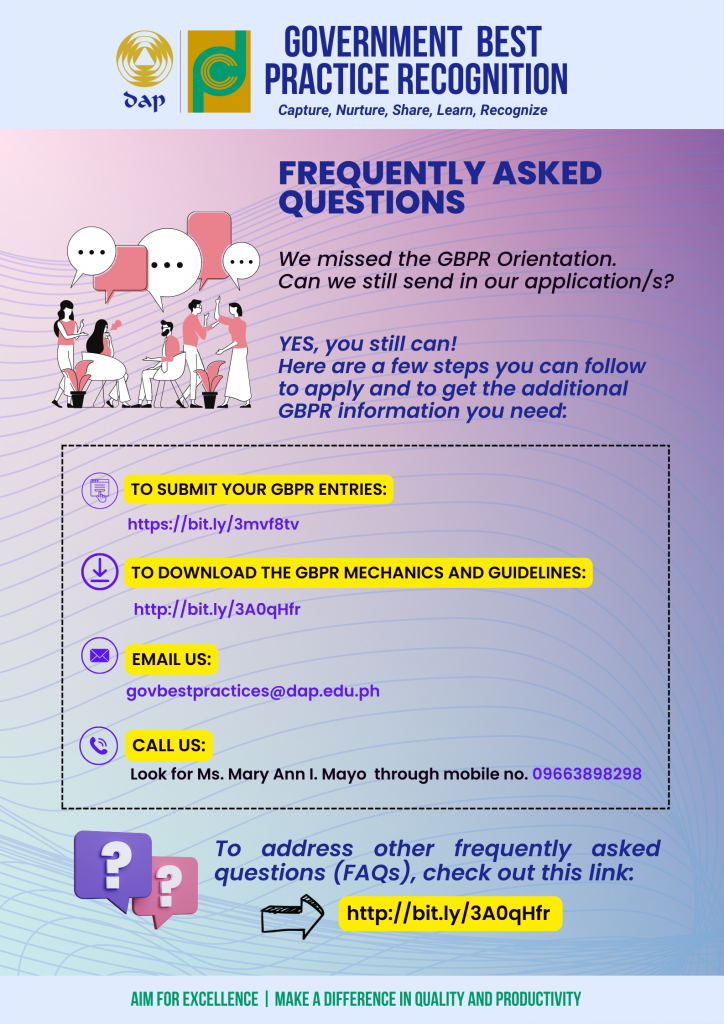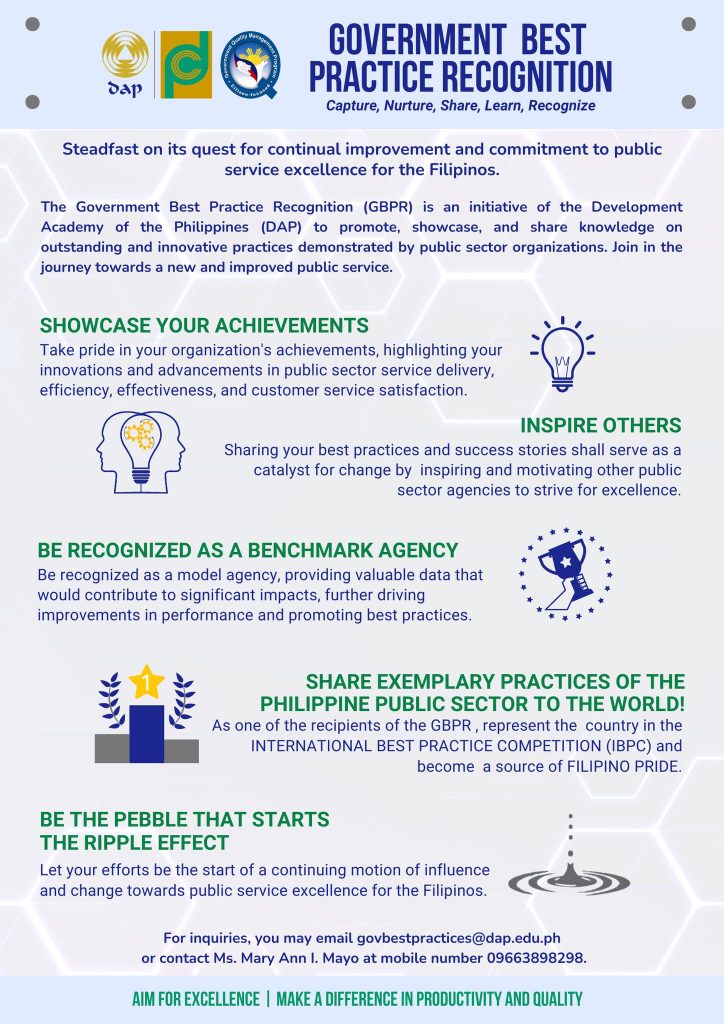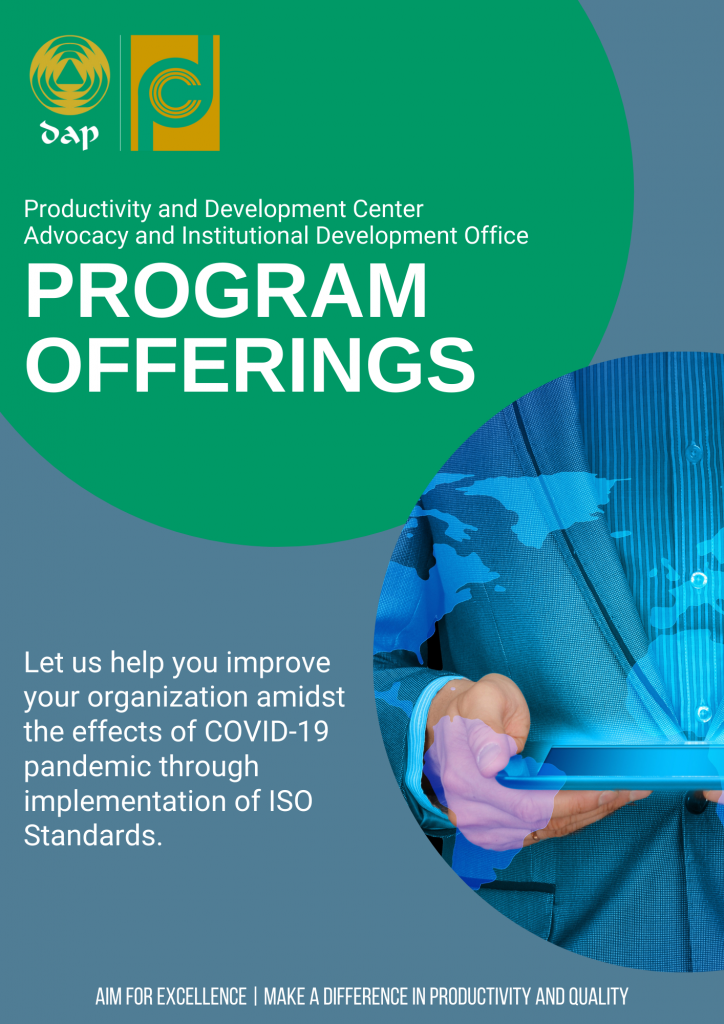The Development Academy of the Philippines’ (DAP) Modernizing Government Regulations (MGR) Program formally launched its 2021 Regulatory Review on 6 October 2021 via Zoom. The event was attended by 56 members and officers of private organizations/associations and officials from regulatory agencies involved in the prioritized government-to-government/agency-to-agency (G2G/A2A) and government-to-business (G2B) transactions.
This year, the MGR Program is focusing on the following transactions that are supportive of reviving the industries that were heavily affected by the current pandemic: a) G2G/A2A regulations affecting the streamlining of service processes; b) G2B regulations covering digital economy; and c) G2B regulations covering food logistics.


During the Launch, the study team research fellows presented the sectoral background, initial regulatory issues and research questions of their respective industries through breakout groups. After the presentation, participants shared their comments and experiences on what regulations/processes contribute to the difficulty in compliance and high transaction cost. The activity also brought to fore initial recommendations on how to address said issues. Among the key issues that were validated and gathered during the activity were as follows:
a. G2G/A2A Regulations Affecting the Streamlining of Service Processes Non-submission of Citizen’s Charter compliance report of about 2,000 agencies, despite the existence of streamlining law – ARTA report
- Regulations on procurement, PBB guidelines, financial and audit regulations, pandemic-related requirements of LGUs, regulations related to Data Privacy Act, and tax payment are perceived to hinder process performance and efficient delivery of services – DAP perception survey initial results
- Inconsistent enforcement of regulations and unreasonable delays in the release of requested documents.
- Inadequate personnel to process a transaction, unclear requirements, and difficulty in accessing the concerned agencies.
b. G2B Regulations Covering Digital Economy
- Application of traditional policies which do not reflect rapid changes, innovations and technology advancements to digital businesses due to prolonged process of law-making
- Difficulty to regulate online businesses due to Department of Trade and Industry’s limited manpower and increasing number of unregistered and unscrupulous businesses online
- Need for coordination and discussion between government agencies to adapt to changes involving government digitization and the shift to online G2B transactions (e.g., recognition and use of electronic signatures)
- Inadequacies in our current laws on the liability of online buying and selling platforms to protect consumers
- Possible challenges on implementing regulatory sandbox framework for financial technology innovations
c. G2B Regulations Covering Food Logistics
- Overregulation of food manufacturing sector and agriculture and LGU restrictions on the delivery of produce during pandemic resulted to wasted produce.
- Low productivity in provinces that were traditionally centers of productivity or food baskets.
- Absence of standards/guidelines/regulations on importation non-traditional products (e.g., rabbit) and stringent requirements of Good Animal Husbandry Practices
- High price of fruits and vegetables due to logistics problem, food safety and other regulatory measures
- Difficulty in implementing viable recommendations of various researches (e.g., DAP Benchmarking Study on Regulatory Management) to effect regulatory reform in the sector
- Additional cost and potential operations delay caused by changes in documentary requirements (e.g., Bureau of Animal Industry’s Certificate of Analysis annual submission compared to previous process of every five years)
- Tedious and unwieldy end-to-end process of online payment, i.e., the need for traditional hard copy of receipts instead of electronic receipt
- Difficulty in obtaining permits to transport livestock and poultry due to sudden change of area condition that gives inconsistent information and entails additional costs to companies.
Following the Launch, the next step will be for the study teams to take a deep dive and prioritize issues gathered from the activity by conducting separate focus group discussions and industry dialogues with the participants from the public and private sector.
xxx
















